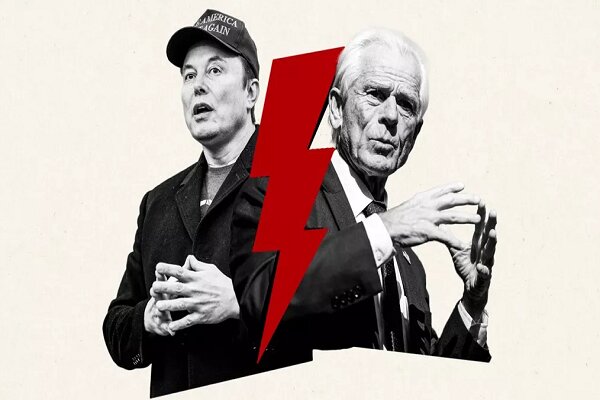Musk vs. Navarro: Economic turmoil and political dispute

TEHRAN - By April 9, the United States faced significant political and economic turbulence due to a heated dispute between Tesla CEO Elon Musk and Peter Navarro, a senior trade adviser to President Donald Trump. The conflict, rooted in Trump’s assertive tariff policies, revealed internal discord within the administration, raised concerns about its economic approach, and ignited extensive discussions about the potential effects on both domestic and international economies.
The row between Musk and Navarro was sparked by Trump’s announcement of sweeping tariffs on imports from over 180 countries, including rates as high as 104% on Chinese goods and 20% on European Union products. Navarro, a staunch advocate for these tariffs, argued they would revitalize U.S. manufacturing and reduce trade deficits. Musk, a proponent of free trade, strongly opposed the policies, leading to a public clash.
On April 7, Navarro dismissed Musk’s calls for a “zero-tariff” policy on CNBC, labeling Tesla as a “car assembler” reliant on imported parts. Musk retaliated on April 8 via X, calling Navarro “truly a moron” and mocking his Harvard economics PhD. Musk defended Tesla’s American-made credentials, citing data showing the Model Y as the most American-made car with 75% of its parts sourced domestically.
The dispute quickly gained media attention, with White House Press Secretary Karoline Leavitt downplaying the conflict as “boys will be boys.” Critics, however, argued that this response trivialized a significant policy dispute with potential economic repercussions.
Reasons behind the clash
The Musk-Navarro feud is rooted in fundamental ideological and economic differences, as well as personal and professional rivalries. Several key factors contributed to the conflict:
Navarro, a staunch protectionist, has long pushed for tariffs to protect U.S. industries and reduce reliance on foreign goods. His role in crafting Trump’s tariff strategy, detailed in Project 2025, reflects his belief that high tariffs will bring jobs back to the U.S. In contrast, Musk, as a global businessman with companies like Tesla and SpaceX reliant on international supply chains, favors free trade. He argued on April 8 that tariffs would increase costs for Tesla and hurt consumers, undermining his vision of innovation and efficiency.
Both men have significant stakes in the outcome. Navarro’s influence depends on the success of Trump’s tariff policy, while Musk’s businesses could face billions in additional costs if the tariffs are fully implemented. This economic self-interest fueled their public clash, with Musk accusing Navarro of misunderstanding trade dynamics and Navarro accusing Musk of prioritizing corporate profits over national interests.
The Contention also reflects a broader power struggle within Trump’s administration. Musk, as head of the Department of Government Efficiency (DOGE), has emerged as a key adviser on deregulation and innovation, while Navarro, as senior counselor for trade and manufacturing, holds sway over trade policy. Their rivalry highlights competing visions for Trump’s economic agenda, with Musk advocating for technological progress and Navarro for industrial revival.
Political consequences, economic impact
This clash carries weighty consequences for Trump’s administration. It highlights internal discord among top advisers, challenging Trump’s image as a decisive leader. The White House’s casual dismissal of the conflict as “boys will be boys” risks undermining trust within the cabinet and among advisers.
Musk’s opposition to the tariffs could weaken Trump’s ability to push his agenda. If Musk, a prominent ally, continues to resist, it may signal to Congress and the public that even Trump’s supporters doubt the tariffs’ effectiveness. This could embolden opposition from Democrats and moderate Republicans, some of whom have already proposed legislation to reclaim Congressional authority over trade policy.
The Trump administration's recent moves, such as imposing reciprocal tariffs on imports from nearly every nation, have led to strained relationships with allies and adversaries alike. These tariffs, ranging from 10% to 50%, have prompted swift countermeasures from affected countries, potentially leading to a more insular global economy.
Politically, Trump's cabinet faces challenges in maintaining diplomatic alliances and navigating the backlash from international leaders. For instance, Australia's Prime Minister criticized the tariffs as illogical and damaging to their alliance. Similarly, Brazil and China have expressed strong opposition, with Brazil considering appeals to the World Trade Organization and China labeling the tariffs as unilateral bullying. These tensions could undermine the United States’ position as a global leader and disrupt the liberal international order.
Economically, the U.S. may experience increased costs for businesses and consumers, potentially leading to a recession. The tariffs could dampen global demand and production, affecting both U.S. manufacturers and international trade partners. Countries reliant on export-led growth, like China, might struggle to adapt, further destabilizing the global economy.
The ripple effects of these policies highlight the interconnectedness of global economies and the importance of diplomatic cooperation. While Trump's administration aims to prioritize American interests, the long-term consequences could reshape international trade dynamics and economic stability.
Clashes expose deeper fault lines
The April 6 protests against Trump and Musk also highlight public outrage over their policies. Thousands rallied in major cities like New York and Los Angeles, opposing Trump’s tariffs and Musk’s role in the administration. Signs like “No to Tariffs, No to Billionaire Rule” captured anger at perceived elitism and economic harm. Fears of job losses and environmental rollback under Musk’s DOGE leadership fueled the unrest, with the Navarro row amplifying concerns about dysfunction in Trump’s team.
Protesters viewed the administration as prioritizing personal rivalries over public welfare, deepening distrust in Trump’s leadership.
From a critical perspective, the Musk-Navarro row reveals deeper flaws in Trump’s governance style: a reliance on loyalists with conflicting agendas, a lack of coherent economic strategy, and a tendency to dismiss serious policy disputes as mere personality clashes.
The protests on April 6 and the market sell-off on April 8 signal a broader crisis of confidence in Trump’s administration. If left unchecked, the conflict could destabilize Trump’s second term, alienate key allies, and accelerate economic decline. International partners, already wary of U.S. protectionism, may seek alternatives to American trade, further isolating the U.S. on the global stage.
Leave a Comment